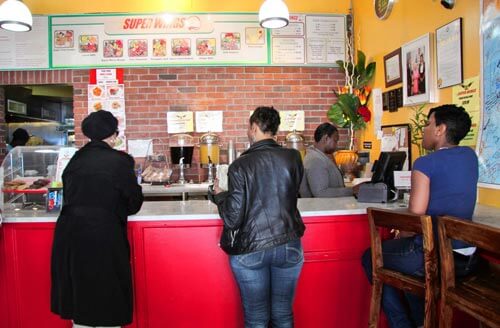Caribbean
A British parliamentary subcommittee is to scrutinize the decision by the BBC World Service to close its Caribbean and four other regional services globally.
The Foreign Affairs Committee will question senior BBC management and hear from unions representing affected staff.
The session will focus on the effects of the changes announced by the World Service on Jan. 26, including the closure of five language services and the ending of radio transmissions in seven languages, including Mandarin Chinese and Russian.
Caribbean
CARICOM continues to put in place effective mechanisms towards ensuring that the Region adopts a harmonized approach to securing, managing and protecting water resources.
The Consortium of CARICOM Institutions on Water – the body tasked with responsibility for developing a Common Water Framework for the Community – recently held its second meeting in St. Lucia.
The Consortium was established in 2008 at a Special CARICOM Meeting of Trade and Economic Development (COTED) to assist member states with developing and implementing their Integrated Water Resource Management Plans.
Its terms of reference were approved at the Joint Meeting of the Council for Human and Social Development and the Council for Trade and Economic development in October 2010.
At the Castries meeting environment and water management specialists who make up the consortium commenced the major task of developing the Common Water Framework for the Community.
Cuba
Preparations for the Caribbean Festival, scheduled for July 9, 2011, have already begun in the eastern Cuban province of Santiago de Cuba.
Director of the Casa del Caribe Orlando Verges said they have already initiated conversations with countries that usually bring large delegations, and noted that Mexico is organizing its delegation to the event, this time dedicated to Trinidad and Tobago.
The previous festival registered 1,393 participants.
This year the festival offers new proposals such as creating a wide area of presentations in La Almeda, given that the Cespedes Park has turned out to be too small for the many national and foreign visitors it receives.
Verges pointed out that the festival sets the stage for the Quema del Diablo, which every year culminates the festival, has gathered nearly more than 20,000 people.
He noted that the festival organizes a series of activities that include music, dance, theater, plastic arts and more.
Guyana
More than 70 of the region’s judges and other representatives from the judiciary system in the Caribbean are to be trained to assist the region in establishing and strengthening Drug Treatment Courts (DTCs).
They recently participated in a four-day training conference entitled “Establishing and Consolidating Drug Treatment Courts in the Caribbean: “A Team Effort” in Montego Bay.
The training intervention forms part of a broader initiative – the Caribbean Drug Treatment Court Project – to help curb substance abuse and its social consequences in the Caribbean, by developing and implementing policies that promote alternatives to incarceration for drug, dependent offenders.
One of the alternative practices being advocated under the project is the introduction of judicially supervised treatment for some types of drug dependent offenders.
Haiti
Hundreds of people danced in the streets of the Haitian capital recently as the city celebrated its first carnival since last year’s devastating earthquake that forced the cancellation of the annual festivities.
The parade field past the ruined facades of downtown shops and the normally buys boulevard outside the collapsed National Palace was turned into a pedestrian zone for three days of revelry.
Organizers erected a plywood wall to separate the carnival zone from the huge Champ de Mars plaza, now a camp for tens of thousands of people made homeless by the quake.
Spectators say that carnival was much smaller than in the past.
Others say the country was not ready to hold any celebration.
The January 2010 earthquake killed an estimated 300,000 people and left much of the capital in ruins. The United Nations say about 800,000 people are still living in temporary settlement camps around the capital.
Jamaica
Jamaican autorities have temporarily suspended cargo flights to the United States due to a reported threat.
Transportation Security Administration spokesman Nicholas Kimball said that the agency is helping the Jamaicans with “precautionary security measures” for U.S.-bound flights following what he called “unsubstantiated threat information.”
He said it was being done out of an “abundance of caution”
American authorities say a temporary suspension of air cargo and duty free items to the U.S. was recently imposed after an “unconfirmed report” of a threat.
No details of the threat were given.
Jamaica
Jamaica’s Tourism Minister Edmund Bartlett is “hopeful” that the banding for Air Passenger Duty (APD) could be changed at this month’s U.K. budget.
Bartlett, speaking in London recently said he welcomed comments from Justine Greening, the coalition government’s economic secretary to the Treasury, who acknowledged the strong ties “that exist between the U.K. and the Caribbean countries.”
Jamaica and other Caribbean destinations ,which have been hit hard by the increase in APD, are lobbying for a new two-band system for the tax instead of the current four bands.
The Caribbean Tourism Organization is hoping that the government will announce a revamped system in the budget on March 23.
“The U.K. government said it will consult on any major changes to APD,” said Bartlett.
Trinidad
Gays. Lesbians, bisexuals and transgender people in Trinidad and Tobago are calling on the government to decriminalize homosexuality.
They say they are tired of being treated like second class citizens, a spokesman for the Coalition Advocating for the Inclusion of Sexual Orientation (CASIO) Colin Robinson said.
He said while being able to get married would be nice, it was really “putting the cart before the horse.”
Robinson sad the government does not need to amend the Sexual Offences Act or decriminalize sexual activities to protect gay people from discrimination and violence.
He argued that while political and religious leaders use religion to justify why gay people should not be afforded the same rights, they have nothing much to say when it comes to carnival and the activities surrounding it.
Trinidad
Prime Minister Kamla Persad-Bissessar said the Trinidad and Tobago economy received a boost of TT$1 billion as a result of government’s investment in carnival.
Speaking with reporters at the Queen’s Park Savannah, Port of Spain on Carnival Tuesday Persad-Bisssessar said the country has received tremendous economic benefits because of the annual festival.
“We have gotten economic benefit to the hotels, the services, transport, food, clothing, in every arena. I want to say more than one billion dollars have come back into the country, and there have been so many foreigners back as well,” she said.
Government is currently in talks with the Tobago House of Assembly to host another carnival in Tobago later this year.
Compiled by Azad Ali

























